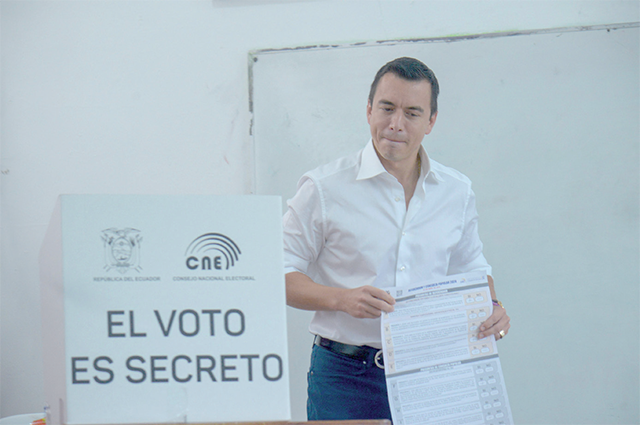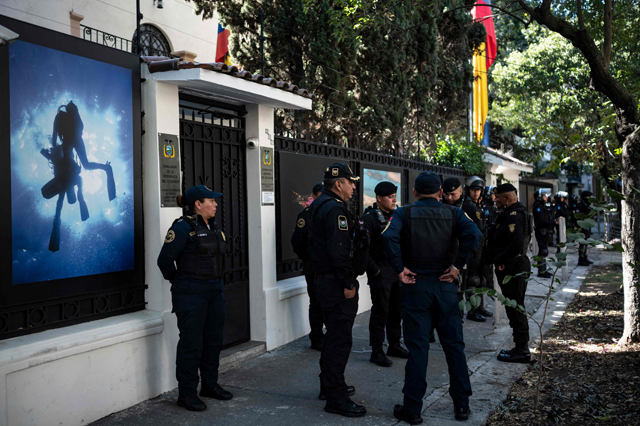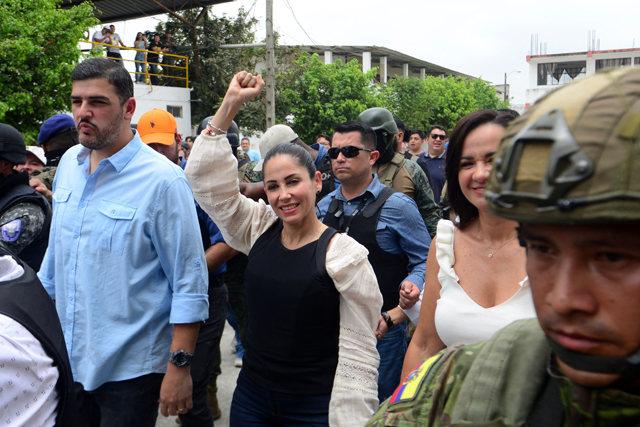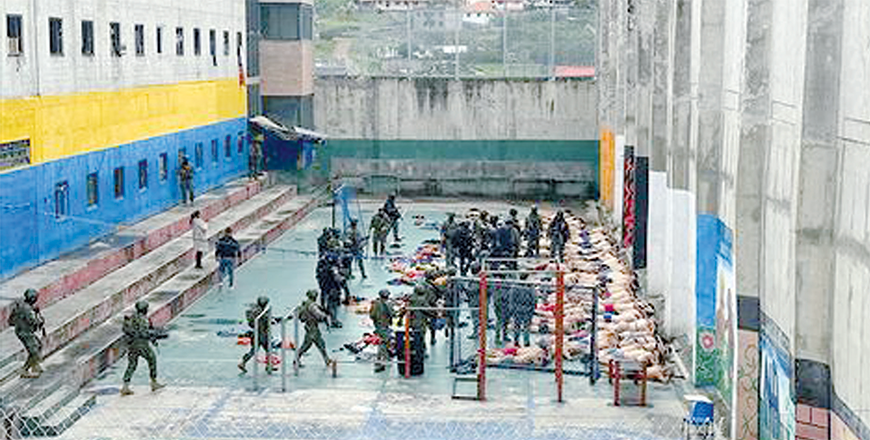You are here
Violence-battered Ecuadorans vote on anti-crime measures
By AFP - Apr 22,2024 - Last updated at Apr 22,2024

Ecuador’s President Daniel Noboa votes at a polling station in Olon, Santa Elena province, Ecuador, on Sunday, during a referendum on tougher measures against organised crime (AFP photo)
QUITO — Ecuadorans vote in a referendum Sunday on proposed tougher measures to fight gang-related crime as the country grapples with a shocking rise in violence that has seen two mayors killed just this week.
The once-peaceful South American country has recently found itself in the grips of a terrorising wave of violence blamed on gangs with links to transnational cartels using its ports to ship drugs to the United States and Europe.
President Daniel Noboa declared in January a state of “internal armed conflict” with about 20 criminal groups blamed for a spasm of violence sparked by the jailbreak of a major drug lord, still on the run.
Gangsters kidnapped dozens of people, including police and prison guards, opened fire in a TV studio during a live broadcast, and threatened random executions in the days-long outburst that caused about 20 deaths.
Noboa imposed a state of emergency and deployed soldiers to retake control of the country’s prisons, which had become the nerve center for gang operations and a bloody battleground that has claimed the lives of more than 460 inmates in three years — many beheaded or burned alive.
Despite these efforts, the violence has persisted, which Noboa has taken as “a sign that narcoterrorism and its allies are looking for spaces to terrorise us”.
Two mayors have been killed in the past week, making it five in a year and three in less than a month.
Since January last year, at least a dozen politicians have been killed in Ecuador, including presidential candidate Fernando Villavicencio, who was gunned down last August after a campaign event.
On Sunday, the president will seek popular backing for his plans to clamp down even harder on those responsible for such acts.
Citizens will be asked to approve an expansion of military and police powers, significantly boosting gun controls and imposing harsher penalties for “terrorism” and drug trafficking.
Noboa is also proposing changing the constitution so that Ecuadorans wanted abroad for organised crime-related offenses can be extradited.
Nearly 13.6 million of the country’s 17.7 million inhabitants are eligible to cast a “Yes” or “No” vote Sunday.
‘Dirty campaign’?
The majority of the referendum questions are related to crime prevention — a priority even as Ecuador also grapples with widespread corruption, a crippling electricity shortage and a diplomatic spat with Mexico.
Last year, the country’s murder rate rose to a record 43 per 100,000 inhabitants — up from a mere six in 2018, according to official data.
In a publication Friday, polling firm Gallup said no other region in the world, excluding active war zones, felt less secure in 2023 to residents than Ecuador’s Guayas province.
Other polls show a majority of Ecuadorans will likely vote for Noboa’s reforms.
“People are endorsing the decisions... taken on the issue of security,” Political Scientist Santiago Basabe of the Latin American Faculty of Social Sciences (Flacso) told AFP.
The vote will take place in the same week that Ecuadorans faced power cuts of up to 13 hours as drought left key hydroelectric reservoirs nearly empty.
The government ordered workers to stay at home for two days in a bid to save scant energy resources.
Noboa has put some of the blame on “sabotage” without naming anyone in particular.
“They wanted to ruin us with sabotage... with a dirty campaign, and they have even tried with international pressure to sanction us as a country... because they are nervous,” Noboa said ahead of Sunday’s referendum, adding he was confident that “’Yes’ will win”.
Noboa, who took office last November at the age of just 35, is also dealing with the backlash from Ecuador’s raid on the Mexican embassy in Quito this month to arrest former vice president Jorge Glas, wanted on corruption charges.
Glas had been granted asylum by Mexico, and Ecuador’s move has been widely condemned. Mexico has filed a lawsuit at the International Court of Justice in The Hague.
Related Articles
QUITO — Ecuador was lambasted across Latin America on Saturday after its security forces stormed the Mexican embassy in Quito to arrest graf
QUITO — Voters in Ecuador went to the polls Sunday to choose a new president in the midst of a drug war and a rash of political assassinatio
QUITO — All remaining 136 prison guards and administrative workers who were seized as hostages during prison riots in Ecuador were freed on


















